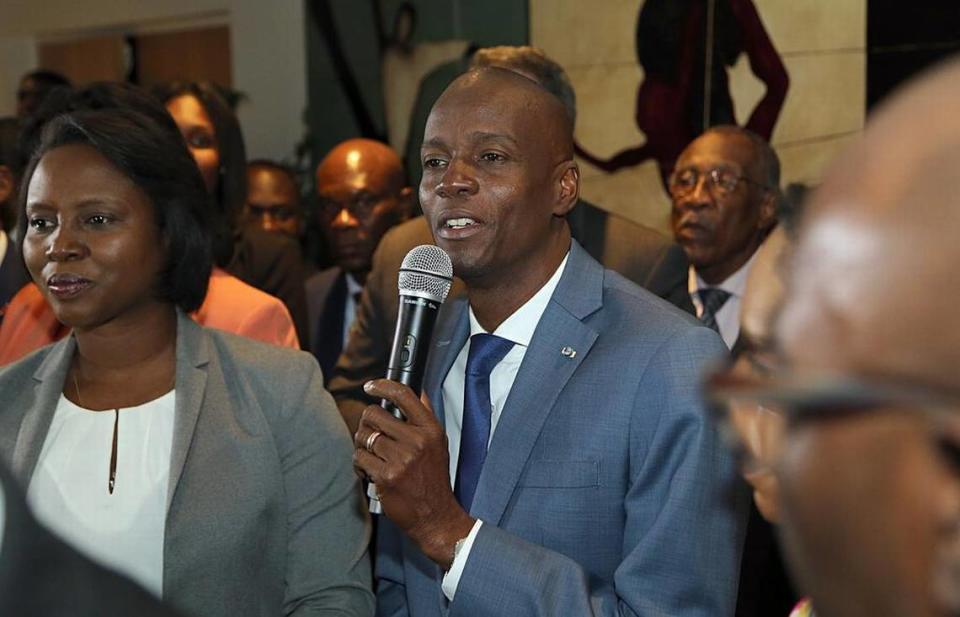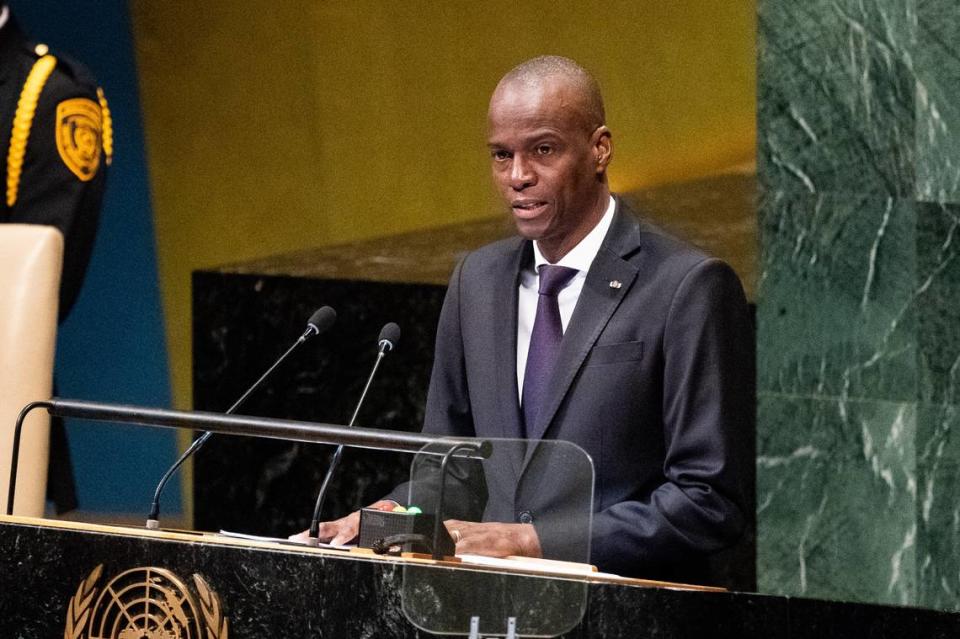Widow of slain Haitian President Moïse awarded multimillion-dollar payout by Miami judge
A half-dozen men convicted in the plot to kill Haitian President Jovenel Moïse must pay his widow and elder son $6.2 million in compensation for their loss, according to a federal judge’s restitution order in a Miami criminal case.
While the president was shot a dozen times during the brazen middle-of-the-night attack at his home in the hills above Haiti’s capital on July 7, 2021, his widow survived and was airlifted to Jackson Memorial Hospital to be treated for her wounds.
Martine Moïse, 50, was awarded $5,305,387 by U.S. District Judge Jose Martinez for her hospital bills, travel and security that she hired when she returned to Haiti 10 days later. Her restitution was jointly recommended by federal prosecutors and defense attorneys following lengthy negotiations.
Although Martine Moïse and her representatives have asserted she was shot in the arm, her injuries have long been a source of debate in Haiti, where earlier this year she was indicted in her husband’s death along with 50 other people, some of them once close to the slain president.
The late president’s elder son, Joverlein Moïse, who is living in Quebec, Canada, was awarded $865,396. It is not clear from the judge’s order why the six convicted defendants have been ordered to compensate the son, who was not in the home at the time of the assassination. The son filed a motion in a Port-au-Prince court to join the investigation, which under Haiti’s French-style law allows an individual hurt by a crime to seek damages from the perpetrators.
It remains to be seen how much the president’s widow and elder son will receive from the six ordered to pay restitution for the 53-year-old Haitian leader’s death, because only one of men is known to have any assets. There’s also a tinge of irony in the federal judge’s order to compensate the widow: Although U.S. authorities view Martine Moïse as a “victim” in her husband’s fatal shooting, in Haiti she’s accused of playing a role in the assassination plot.
Martine Moïse’s South Florida attorney, Paul Turner, called the allegations by a Haitian investigative judge “nonsense” and “politically motivated,” saying she had no “advanced knowledge” of the assassination.
In the restitution agreement filed last week in Miami federal court, Martinez did not identify the widow and elder son in his final decision. They are listed as “Victim 1” and “Victim 2.” But the Miami Herald has learned from the widow’s lawyer that Martine Moïse is the first victim; others familiar with the case say Moïse’s elder son, Joverlein, is the second.
Turner said that he provided the team of federal prosecutors with receipts for the widow’s medical treatment at Jackson Memorial Hospital along with other expenses for her travel and security, calling the restitution amount a “compromise.”
Turner said he and Martine Moïse, who is currently living in South Florida, were grateful that a settlement was reached between the prosecutors and defense lawyers rather than her being forced to testify about the hospital bills and other expenses in a court hearing before the federal judge in Miami.
“We are happy that we didn’t have to do that,” Turner told the Herald. “We didn’t want to fight over it, and she didn’t want to go to court.”
It remains unclear, what outstanding hospital payments Martine Moïse incurred. Documents obtained by the Miami Herald show that the Haitian government in the days after the killing spent more than $330,000 toward her medical care and private air transport for the family.
On July 7, the Haitian embassy of Haiti in Washington wired $100,000 to a Citibank account for the Haitian consulate in Miami for the first lady’s medical expenses. A separate letter from Haiti’s Ministry of Foreign Affairs written to the U.S. Embassy in Port-au-Prince confirmed the fund transfer and said it was to support the air transport of the First Lady.
The Haitian embassy in Washington, which has been plagued by a financial corruption scandal, also issued a series of three checks, for $22,000, $22,875 and $27,940, between July 7 and July 9 for the presidential family to take a charter flight from Port-au-Prince to Miami.
On July 26 the Haitian embassy transferred another $105,950 to the Haitian consulate in Miami’s Citibank account. Again, the U.S. Embassy in Port-au-Prince was notified about the bank transfer. This time, Haiti’s foreign ministry said “the funds will be used to cover related medical expenses at Jackson Memorial Hospital.” Attached was a letter from Jackson, stating that the “deposit will be collected to cover medical cost for $105,950 from the Miami Consulate of Haiti.”
Two days after Jackson Memorial received that money, the Haitian embassy wrote a check for $59,100 for another charter flight for the presidential family. Again, the U.S. Embassy was notified in separate correspondence about the transaction.
When Martine Moïse returned to Haiti for her hsuband’s burial service on July 23, she disembarked the flight at the Port-au-Prince airport wearing a black dress, a black bulletproof jacket, a black face mask, and her right arm in a black sling.
Miam-Dade lawsuit
The widow and her late husband had two other children who were in their home during the assault nearly three years ago but were not injured. They are represented by their mother in a separate lawsuit that brought last year against all 11 defendants named in the criminal indictment filed in Miami federal court.
Turner said the civil case, which seeks separate damages for her late husband’s lost wages, emotional distress and other claims, is on hold pending the outcome of the criminal case. The remaining five criminal defendants face trial next January.
Asked about the challenge of collecting damages from as many as 11 defendants, Turner acknowledged the difficulty and said it is his hope to add possibly other defendants with deeper pockets to the lawsuit.
READ MORE: Plots, subplots and betrayal engulfed Haiti’s president before his assassination
Over the past two years, a half-dozen men have pleaded guilty in the Miami case, which is built upon a violation of the U.S. Neutrality Act and a conspiracy to kill a foreign leader. Prosecutors say the plot pivoted on planning in South Florida and Haiti, with the initial goal of replacing Moïse with a Haitian physician and pastor, Christian Emmanuel Sanon, and deploying former Colombian soldiers to carry out the president’s assassination.
The six defendants convicted so far are: Rodolphe Jaar, a Haitian-Chilean businessman previously convicted of drug-trafficking in Miami federal court; Joseph Joël John, a former Haitian senator; Joseph Vincent, a Haitian American who worked as an informant for the Drug Enforcement Administration; Germán Alejandro Rivera Garcia, aka “Colonel Mike,” a former Colombian military officer who ran the commando squad; and Mario Antonio Palacios Palacios, a former Colombian soldier recruited by Rivera. Those five were sentenced to life in prison, but they are cooperating with federal prosecutors and the FBI in the hope of receiving lesser time.
READ MORE: Who was involved in killing of Haiti president Jovenel Moise?
Last month a sixth defendant, Frederick Bergmann, was sentenced to nine years in prison for breaking federal laws meant to keep the U.S. out of overseas conflicts. A resident of Tampa, he was sentenced to a year less than the maximum for shipping ballistic vests to Haiti that were used by the Colombian commandos who carried out the deadly attack on the president.
Bergmann had no idea the vests were going to be used in the conspiracy to kill Haiti’s president, according to federal prosecutors and his defense attorney. That’s why he wasn’t charged with the conspiracy targeting Moïse.
The remaining five defendants, including Sanon, are charged with conspiring in South Florida to kill Haiti’s leader. The conspiracy charge carries up to life in prison.
The defendants facing trial are: Antonio “Tony” Intriago, the head of a Miami-area security firm, Counter Terrorist Unit Security or CTU; Arcángel Pretel Ortiz, who was a former FBI informant when he joined Intriago at CTU; Walter Veintemilla, a Broward County financier; James Solages, a Haitian American; and Sanon, who was initially seen by the group as a successor to Moïse as Haiti’s president.
In February, after Haitian authorities named him as an “intellectual author of the plot” in their case, Sanon was charged in Miami with the others with conspiring to kill Haiti’s leader, after first being accused of trying to carry out a military expedition against a foreign country. It was the fifth superseding indictment filed by prosecutors Andrea Goldbarg, Monica Castro and Frank Russo.
Martine Moïse, is expected to be a “key witness” for the federal government at the upcoming trial, according to her lawyer.



